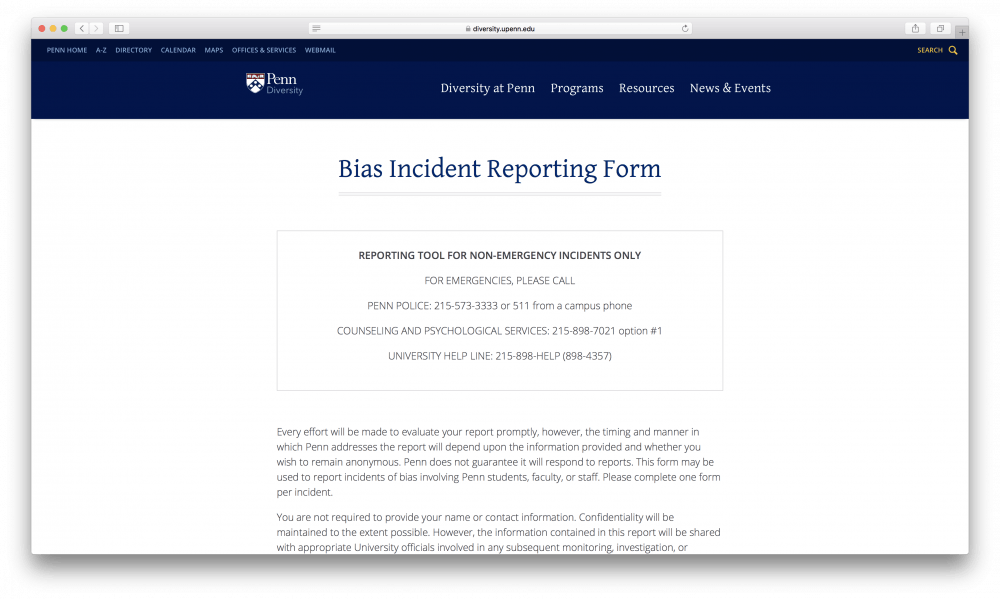
File Photo
Following a half year of collaboration between graduate and professional students and administrators, Penn unveiled its first University-wide online bias incident reporting form on Tuesday afternoon.
The form allows students to report incidents, such as sexual misconduct and discriminatory harassment, anonymously. It also allows users to describe the incident including possible motivating factors such as age, disability, or sexual orientation. Provost Wendell Pritchett announced the website’s launch in an email sent to graduate and professional students Tuesday.

Screenshot of the the University-wide online bias incident reporting website.
“We continue our long-standing collaboration with the Graduate and Professional Student Assembly … to identify and implement concrete solutions to the most important concerns of graduate and professional students,” Pritchett wrote.
“We encourage you to work with GAPSA to share your ideas and suggestions in the year ahead,” he continued.
GAPSA formally proposed the creation of an online system to report bias in a February 2017 resolution, which also vouched for a campus Central Diversity Office — an initiative which Joann Mitchell, the inaugural chief diversity officer, said was “under consideration” in an April statement.
Mitchell — who worked with GAPSA's Inclusion, Diversity, Equity, Access and Leadership Council and the Provost’s Office to draft the form — was not available for comment.
“It fills me with motivation to work hard this year to give marginalized and underrepresented students the best Penn graduate experience,” IDEAL Council Chair Francisco Saldaña, who is pursuing a master's degree in nanotechnology, wrote in an email.
The form is finally live, yet former GAPSA Equity and Access Chair Betsy Sneller, who graduated with a Ph.D. in linguistics in 2018, said administration had pushed back the release of the document several times before.
“I do know that the online bias reporting form was supposed to be live in January of last year, and that got pushed back,” Sneller said. “It’s been something the administration itself has agreed to do and has put a couple hard deadlines on before.”
Earlier this year, administrators indicated the form would launch by the end of April.
IDEAL previously collaborated with student activists to create a bias incident reporting form in 2016 following a series of racist GroupMe messages which were sent to black Penn freshmen — drawing the attention of the Federal Bureau of Investigation.
Haley Pilgrim, GAPSA’s current and first black woman president and sociology Ph.D. candidate, said the form would not only foster a more inclusive environment and “return agency to the victim of an aggression,” but would also help Penn collect data on experiences of bias on campus.
“It is important we collect this data if we are to take seriously the goal of making sure Penn feels like home to all students. Data lets us see our community's needs, helps us make informed decisions on where our initiatives would be most helpful, and [helps us] measure our effectiveness,” Pilgrim wrote in an email.
“I know that there are students who read that email and felt more at ease, and that is a beautiful thing to be a part of.”
GAPSA and Graduate Employees Together-University of Pennsylvania, or GET-UP, have also called upon Penn to improve its sexual harassment reporting procedures.
Advocates have noted that some policies, such as requiring that all reports of sexual harassment be brought to the dean of the student's school, who has the power to determine whether to conduct an investigation or take any action following the complaint, can be troublesome for those reporting.
According to Jenn Phong, a member of GET-UP and a fourth year Ph.D. student in educational linguistics, the form could help get around this reporting issue due to the anonymous nature of the website.
She added, however, that questions about the organization of the reporting system still linger. She wrote in an email that she wonders whether the reports will be sent to specific schools or departments, if they will be sent immediately, or if they will be aggregated into a single report after a certain period of time.
The Daily Pennsylvanian is an independent, student-run newspaper. Please consider making a donation to support the coverage that shapes the University. Your generosity ensures a future of strong journalism at Penn.
Donate







